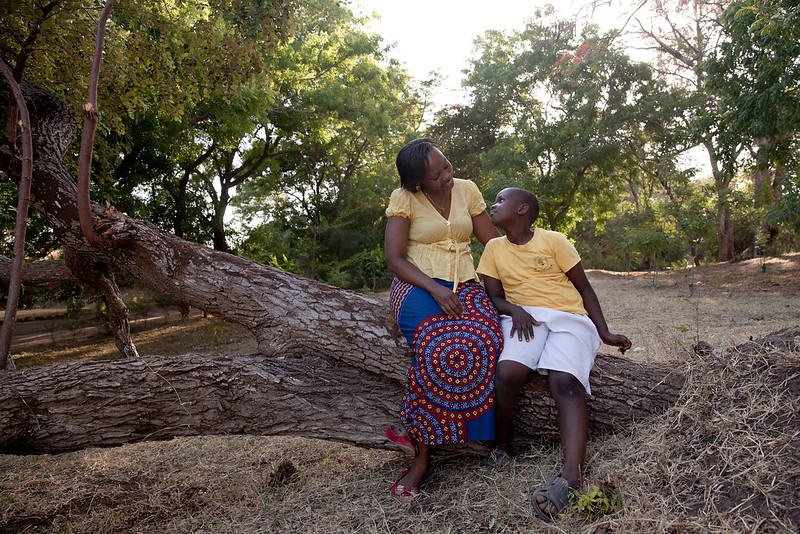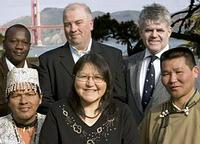環保金人獎基金會16日宣布2012年6位得主,表彰他們用生命捍衛環境與社區。此獎項已持續23屆,每年頒發給全球六大區域選出的基層環保英雄,是全球性基層環保行動獎項中最大規模的,每位獲獎者會得到15萬美元獎金。
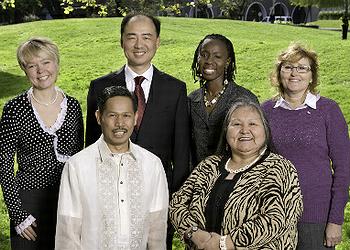
主辦單位16日晚間在舊金山歌劇院的非公開儀式中頒發獎金,18日則於華府的史密森國家自然史博物館舉辦一個小型公開儀式。
環保金人獎是1989年由已故的舊金山公民運動領導人兼慈善家古德曼(Richard N. Goldman)與妻子( Rhoda Goldman) 共同創立。此獎項今年度候選人包含了超過50個致力於環保議題的組織及150位來自70個國家的環境專家,歷時5個月的資料確認後,由國際評審團無記名投票選出獲獎者。
自1989年起,共產生了來自81個國家的151名致力於保護環境的環保金人獎獲獎人。2012年六位獲獎人介紹如下:
非洲:Ikal Angelei阻止蓋大壩
 來自肯亞的Ikal Angelei獻身於阻止奧莫河(Omo River)上興建吉貝三級大壩(Gibe 3 Dam)(譯註:大壩位於衣索比亞),奧莫河挹注了90%圖爾卡納湖(Lake Turlana) (譯註:圖爾卡納湖位於肯亞)的水源。
來自肯亞的Ikal Angelei獻身於阻止奧莫河(Omo River)上興建吉貝三級大壩(Gibe 3 Dam)(譯註:大壩位於衣索比亞),奧莫河挹注了90%圖爾卡納湖(Lake Turlana) (譯註:圖爾卡納湖位於肯亞)的水源。
圖爾卡納湖名列世界遺產中,是世界上最大的沙漠湖泊,鱷魚,河馬,蛇,魚等生物棲息其間。它提供了當地成千上萬的農民、牧民和漁民重要的水源。
吉貝三級大壩將成世界第四大、非洲最大的水力發電廠。因興建大壩導致的水位下降、湖泊萎縮預期將增加貧困社區間的資源衝突。
Angelei生長於種族間的暴力盛行的圖爾卡納湖盆地,服務於圖爾卡納盆地人類學研究中心,她首次聽聞衣索比亞大壩興建的消息是在2006年。對大壩興建過程中完全沒有對當地社區溝通過程的憤怒,Angelei於2008年成立了「圖爾卡納湖之友(Friends of Lake Turkana,簡稱FoLT)」社團。
Angelei結合了在地被蒙在鼓裡的長老、酋長及意見領袖們,並整合了圖爾卡納湖區意見紛歧的社區共同反對大壩的興建。在2009年2月,當地部落發表「圖爾卡納湖人民宣言」,委任FoLT為他們對外反對大壩的意見代表。
Angelei帶著宣言會見了肯尼亞國會議員和內閣部長,敦促他們重新考慮肯亞與衣索比亞的電力採購協議。2011年8月,議會一致通過要求肯亞政府必須提出獨立的環境影響評估。聯合國教科文組織世界遺產委員會亦要求在進一步調查結果出爐前,停止大壩建設。Angelei說服世界銀行,歐洲投資銀行和非洲開發銀行等各大銀行,撤回其對於吉貝三級大壩的融資。
目前吉貝三級大壩已完成40%,衣索比亞政府正努力的籌措資金。如果肯亞在電力協議上與依索比亞不同步,將使包含最大投資國中國在內的投資者卻步。
亞洲:馬軍的毒蘋果戰役
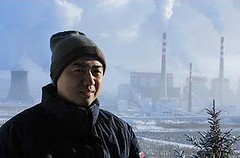 來自中國的馬軍是一位致力監督企業違背中國空污法及水污法的記者。
來自中國的馬軍是一位致力監督企業違背中國空污法及水污法的記者。
馬軍近期最受矚目的便是對蘋果公司的報導,蘋果名列2010綠色IT報告的29家重金屬污染公司的其中之一、且是唯一藉由維護供應商隱私政策為由沒有回應的公司。
馬軍結合了非政府組織,發動了「毒蘋果」抗爭活動,抗議蘋果公司對產品供給鍊缺乏監督。2011年9月,經過一年半的沉默,蘋果公司接觸中國的環保團體,並開始督導其供應商必須清理其產出的廢棄物。
馬軍的戰役始於1990年代,當他目睹中國許多流域環境污染和因而遭殃的人民,他將作品發表於南華早報(South China Morning Post)。他的著作「中國水危機」喚起了全中國的環保意識。
認知到訊息提供促進公眾參與污染防制,馬軍創辦了公眾與環境事務研究所(簡稱IPE),並將得自中國政府的監測數據上網,並將前述數據結合於在空氣污染、水污染地圖上。至今馬雲和他的團隊揭露在中國經營的本地及跨國公司超過90,000筆污染空氣和水的事蹟。
透過至少41個當地非政府組織參與的選擇綠色供應鏈計劃(Green Choice supply chain program),IPE鼓勵消費者以他們的購買力,影響企業的採購和生產過程。雖然沒有政府的強制力,在馬軍的領導下,IPE已成功地獲得超過500家公司公布他們清理其設施的計劃與成果。
馬軍目前致力於與主要品牌( 如沃爾瑪、Nike、通用電氣、可口可樂、西門子、Vodafone、H&M,愛迪達,Sony,Unilever、Levi's and Lenovo等 )合作,所有公司都會引用IPE的地圖和並自約束生產線的運作。
歐洲:Evgenia Chirikova捍衛莫斯科森林
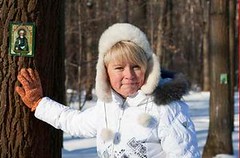 來自俄羅斯的Evgenia Chirikova則為了莫斯科北郊2500畝聯邦保護公園Khimki森林的生存奮戰。
來自俄羅斯的Evgenia Chirikova則為了莫斯科北郊2500畝聯邦保護公園Khimki森林的生存奮戰。
2007年,俄羅斯政府宣布將修建一條連接莫斯科和聖彼得堡的公路。在缺乏公眾參與的政府規劃中,選定的路線會將該地區的最後的老齡林之一Khimki森林一分為二,忽略可能保存森林的任何替代方案。
這條路線會為莫斯科的人口稠密區帶來木材及周邊發展的高額利潤,但對在地的交通壅塞情況則無所助益。2009年,總理普廷簽署了一項為了「運輸和公共建設」改變了森林的保護狀況的法令。同年政府批准了法國Vinci建築公司建設高速公路80億美元的合同,Vinci公司的俄羅斯合作夥伴則包括普廷的朋友和贊助者。
身為一個中產階級、兩個女孩的母親,Chirikova選擇搬遷至Khimki的乾淨小鎮以使小孩在親近自然的環境成長。在2007年的某一天,她發現樹木都被標誌了紅色的「X」作為要砍伐的標誌。
Chirikova雖沒有草根運動的經驗,仍毅然辭去工程師的工作,轉而組織保護Khimki森林團體,並號召公眾反對高速公路計畫。雖然遭致政府迫害,Chirikova仍成功獲得大眾的支持。保護Khimki森林第一次集會活動號召了5000多人,成為俄羅斯史上規模最大的環境抗議活動,並獲集了超過5萬個簽名。
Chirikova和她的伙伴們認為,高速公路的主要財政支持者—歐洲復興與開發銀行和歐洲投資銀行—撤回他們的資金,代表了環境、社會和金融界對此案的關注。政府已多次逮捕及拘留Chirikova並散佈毫無根據的謠言指稱她是美國間諜。Chirikova還必須面對兒童保護當局的不實指控,聲稱她忽視和虐待孩子,並威脅要帶走她的孩子。儘管如此,Chirikova和她的伙伴們仍繼續爭取替代路線和制止破壞森林。
太平洋島嶼:Edwin Gariguez對抗外資採礦
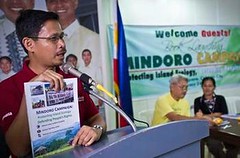 來自菲律賓的Edwin Gariguez在明多洛島(Mindoro)對抗挪威礦業Intex公司的露天鎳礦開採計畫。
來自菲律賓的Edwin Gariguez在明多洛島(Mindoro)對抗挪威礦業Intex公司的露天鎳礦開採計畫。
Gariguez是明多洛島上Mangyan天主教教會的神父,當地人多稱暱稱他為「Edu神父」。
Intex公司預定礦區位於明多洛島上四條淡水河的水源、擁有高度生物多樣性的水域。這四條河供給島上區民飲用水及農田灌溉用水。且該預定區域為島上Mangyan原住民的傳統領域,礦脈的探勘階段已褻瀆了他們的墓地。
Intex公司將使用酸過濾法來提取鎳礦。這個過程會產生數百噸有毒廢物,島上的水資源將受到毒害、熱帶雨林將被摧毀。為了對抗鎳礦開採,Gariguez結合明多洛島居民、民選官員、民間團體、教會領袖和原住民形成同盟。
雖然不反對開採本身,Gariguez相信環境保護、原住民社區權利的保持、經濟利益的公平分配等項目應被開發公司確保。
即便來自礦業官員和軍方口頭騷擾與暴力威脅不斷、且工作伙伴因為他的行動遭到謀殺,Gariguezb仍成功停止Intex公司大規模開採活動。由於Intex公司忽略當地的法規,所以Gariguez前往歐洲對挪威國會和Intex公司股東發表演說,讓他們開始關注採礦衍生的相關問題。
協同挪威非政府組織,Gariguez向經濟合作與發展組織提出申訴。2009年,他進行為期11天的絕食,直到聯邦環境和自然資源部(DENR)同意對採礦造成的環境和社會的侵害進行調查。
DENR無限期吊銷Intex公司採礦許可。最後,Intex公司的主要資助者撤除資金,迫使Intex公司在2010年試圖以24億美元出售此計畫但未獲成功。拙劣的銷售計畫後不久,Intex公司的CEO因「嚴重挫折」而辭職。
北美:Caroline Cannon阻止油田入侵北極海
 來自美國的Caroline Cannon致力於阻止在北極海域激增的石油及天然氣鑽探。
來自美國的Caroline Cannon致力於阻止在北極海域激增的石油及天然氣鑽探。
Cannon是居住於阿拉斯加極圈內的楚科奇海(Chukchi Sea)海岸的偏遠村莊希望角(Point Hope)僅存的700名伊努皮愛克人( Inupiat)之一。如同他們的祖先幾千年來所為,伊努皮愛克人靠捕獵楚科奇海的北極露脊鯨,海象,北極熊,魚類,候鳥維生。
為了守護這些資源,Cannon從阿拉斯加來到華盛頓特區,代表希望角的人們出席上百場的工業會議及聯邦會議,在這些會議中分享北極海洋環境包括鯨類遷徙、海象的棲地及冰流的動態等傳統知識。
Cannon代表伊努皮愛克人,面對與美國政府2007-2012年在該地海上石油和天然氣開發計劃間的聯邦訴訟。她代表希望角的住民作為共同原告,於2009年獲得聯邦法院裁決,認為在石油及天然氣的開採契約缺乏考量對當地海洋環境產生的重大影響。所有的開採契約如今只剩一份仍在運作,Cannon和她的同伴繼續在聯邦法院努力對抗這份契約。
Cannon目前仍持續遊說國會,對抗產業界及政府在選舉年所承受來自各方期待國內能源發展及提升就業機會的壓力。
她與其他環保夥伴正號召大眾,共同反對2012-2017聯邦計畫,反對殼牌公司在楚科奇海開鑿數個石油與天然氣井。
中南美:Sofia Gatica對抗農藥噴灑
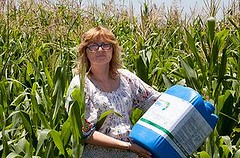 來自阿根廷的Sofia Gatica組織反對勢力來對抗威脅人類和環境健康大範圍的農藥噴灑。
來自阿根廷的Sofia Gatica組織反對勢力來對抗威脅人類和環境健康大範圍的農藥噴灑。
Gatica住在阿根廷中部被大豆田包圍的地區Ituzaingó,在她僅初生三天的女兒因腎衰竭過世後,Gatica發現社區中的癌症發生率比國內其他區域高了41倍。神經系統和呼吸系統疾病、出生缺陷和嬰兒死亡亦高於其他地區。
只有高中學歷、沒有任何組織經驗的Gatica,結合了Ituzaingó的16位為人母者成立「Ituzaingó母親」團體,共同制止Ituzaingó區的農業濫用。
阿根廷是世界第三大大豆出口國。每年,大豆產業噴灑超過5000萬加侖的農藥(硫丹endosulfan和草甘膦glyphosate),這些農藥的主要成分是孟山都公司 (Monsanto) 生產的Roundup除草劑。
雖然孟山都公司聲稱這些成分對人體無害,2008年的科學研究發現即便在低濃度時,草甘膦導致人類胚胎,胎盤和臍帶細胞的死亡。硫丹為已在80個國家禁止的農藥,2011年5月,硫丹被加入斯德哥爾摩公約「應被消除持久性有機污染物(persistent organic pollutants to be eliminated)」清單中。
「Ituzaingó母親」團體有了上述發現後,他們結合環保團體發起「停止噴灑」活動。他們發佈新聞、出版教材將農藥的危險性告知大眾。Gatica和「Ituzaingó母親」成員皆飽受來自個人、警察及企業主的侮辱和威脅。2007年有人持槍闖入Gatica威脅她退出選舉,但她堅持自己的立場。
2008年,阿根廷總統下令該國衛生部長調查使用農藥對的Ituzaingó。在布宜諾斯艾利斯大學醫學系進行的研究證實了農藥殘害公眾健康。接下來,Gatica成功獲得市政條例通過,Ituzaingó禁止在靠近住宅2500米範圍內空中灑藥。
從2010年最高法院的裁決不只禁止在住宅區的農藥噴灑,它也扭轉了舉證責任。未來不再由居民提出噴灑造成損害的證據,而是政府和大豆生產者必須證明所使用農業的安全。
其他阿根廷的城市已要求Gatica幫助解決類似的問題。她與其他停止噴灑活動者正致力於要求停止所有空中噴灑,且在使用農藥時應建立緩衝地帶,避免在靠近住宅區及和水路附近使用農藥。
阿根廷將在2013年7月全面禁用硫丹,Gatica和她的伙伴們現正推動全國禁用草甘膦。
The Goldman Environmental Foundation today announced the six winners of the 2012 Goldman Environmental Prize, people who protect the environment and their communities, often at risk of their lives.
Now in its 23rd year, the Goldman Environmental Prize, is awarded annually to "grassroots environmental heroes" from each of the world's six inhabited regions. It is the largest award for grassroots activism with an individual cash prize of $150,000 for each winner.
The 2012 winners will be awarded the prize at an invitation-only ceremony this evening at the San Francisco Opera House. A smaller ceremony at the Smithsonian's National Museum of Natural History in Washington, DC will follow on Wednesday.
The Goldman Environmental Prize was established in 1989 by late San Francisco civic leaders and philanthropists Richard and Rhoda Goldman.
Prize winners are selected by an international jury from confidential nominations submitted by a worldwide network of environmental organizations and individuals. The jury considers nominations from more than 50 organizations working on environmental issues and 150 environmental experts from more than 70 countries. These nominations are researched and fact-checked over a five-month period, during which time hundreds of references are contacted.
Since 1989, 151 winners from 81 countries have received the Prize for outstanding efforts to preserve and enhance the environment.
Lake Turkana, a World Heritage Site, is the largest desert lake in the world, populated by crocodiles, hippos, snakes and fish. It serves as a critical water supply for the hundreds of thousands of indigenous farmers, herders and fishermen.
Gibe 3 Dam would be the largest hydroelectric plant in Africa, and the fourth largest in the world. The dam is expected to cause the water level in the shrinking lake to drop even farther. Poverty and resource conflicts between communities are likely to increase as a result.
Raised in the Lake Turkana Basin where inter-ethnic violence is rife, Angelei was working at the Turkana Basin Institute, an anthropology research center, when she heard about Ethiopia's construction of the giant dam, begun in 2006.
Outraged that it was being built without consultation with local communities, she founded the group Friends of Lake Turkana, FoLT, in 2008.
Angelei informed elders, chiefs and opinion leaders, none of whom had heard about the dam, and brought together Lake Turkana's divided indigenous communities to fight the dam.
In February 2009, local tribes issued a "Lake Turkana People's Declaration" stating that they had given FoLT the mandate to communicate their grievances regarding the dam.
Angelei took the declaration to Kenyan MPs and Cabinet ministers, urging them to reconsider Kenya's power-purchasing deal with Ethiopia.
In response, in August 2011, the Kenyan Parliament passed a unanimous resolution for the Kenyan government to demand an independent environmental assessment from Ethiopia.
UNESCO's World Heritage Committee responded by passing a resolution to halt dam construction pending further investigation.
Angelei convinced major banks, including the World Bank, the European Investment Bank and the African Development Bank, to withdraw their financing of the Gibe 3 Dam.
Currently, the Gibe 3 Dam is 40 percent complete and the Ethiopian government is struggling to secure funding. If Kenya pulls out of its power purchase agreement with Ethiopia, it would jeopardize future funding for the project as China, the last big investor, might not be able to justify its investment.
Ma Jun of China, the 2012 Goldman Prize winner for Asia, is a journalist who became a watchdog for corporate violations of China's air and water pollution laws.
Ma's most recent high-profile effort involved Apple, one of 29 companies named in a 2010 Green IT report about heavy metal pollution in China and the only company that did not respond, citing a policy of keeping supplier information secret.
He led a coalition of nongovernmental organizations to launch a "Poison Apple" campaign, protesting the company's lack of supply chain oversight.
In September 2011, after a year and a half of silence, Apple approached Chinese environmental groups and began to drive its suppliers to clean up their practices.
Ma's campaign is rooted in his work at the "South China Morning Post" in the 1990s, when he witnessed environmental pollution and sufferings of people in many watersheds in China. His book "China's Water Crisis" became a national call for environmental protection.
Realizing that access to information facilitates public participation in pollution control, Ma founded the Institute of Public and Environmental Affairs, where he organizes monitoring and enforcement data from the Chinese government, making it public online in air and water pollution maps.
To date, Ma and his team at IPE have exposed over 90,000 air and water violations by local and multinational companies operating in China.
Through its Green Choice supply chain program, with its 41 local NGO participants, IPE has encouraged consumers to use their buying power to influence corporate sourcing and manufacturing behavior.
Although IPE has no regulatory authority within the government, under Ma's leadership the organization has succeeded in getting more than 500 companies to disclose their plans and efforts to clean up their facilities.
Ma is now working collaboratively with major brands such as Wal-Mart, Nike, GE, Coca Cola, Siemens, Vodafone, H&M, Adidas, Sony, Unilever, Levi's and Lenovo, all of whom now reference the maps and self-regulate their operations.
Evgenia Chirikova of Russia, the 2012 Goldman Prize winner for Europe, is fighting for the life of the Khimki Forest, 2,500 acres of federally protected parkland in a northern suburb of Moscow.
In 2007, the Russian government announced plans to construct a highway that would connect Moscow and St. Petersburg. Without public involvement, the government selected a route that would bisect Khimki Forest, one of the region's last old-growth forests, ignoring alternatives that would have preserved the forest.
The route would yield profit from timber and development close to expensive, densely populated areas of Moscow, but would not relieve the region's traffic congestion.
In 2009, Prime Minister Vladimir Putin signed a decree that altered the forest's protected status to allow for "transport and infrastructure." That year, the government awarded an $8 billion contract for the highway's construction to Vinci, a French construction company whose Russian investment partners include a Putin friend and supporter.
A middle-class mother of two girls, Chirikova moved to the small, clean town of Khimki so that her daughters could grow up closer to nature. One day in 2007, she discovered trees marked with a red "X" that tagged them for removal.
With no experience in grassroots organizing, Chirikova left her engineering job to form the group Defend Khimki Forest, and began organizing public opposition to the highway project.
Despite government persecution, Chirikova has succeeded in gathering widespread support. Defend Khimki Forest's first rally drew a crowd of 5,000 people, one of the largest public environmental protests in Russian history, and gathered more than 50,000 signatures.
Chirikova and her colleagues convinced the European Bank of Reconstruction and Development and the European Investment Bank, major financial backers of the highway, to withdraw their funding, citing environmental, social and financial concerns.
Government officials have arrested and detained Chirikova numerous times and circulated baseless rumors that she is an American spy. She has fought false claims of neglect and mistreatment from child protection authorities who threatened to take her children. Still, Chirikova and her colleagues continue to fight for an alternative route and a halt to the forest destruction.
Edwin Gariguez of the Philippines, the 2012 Goldman Prize winner for Islands, is battling an open-pit nickel mine on the island of Mindoro proposed by the Norwegian mining company Intex.
Affectionately known as "Father Edu," Gariguez is a Catholic priest and pastor of the Mangyan Mission Catholic Church on Mindoro.
The proposed mine area is within a biodiverse watershed that feeds the island's four major rivers, which provide drinking water to lowland communities and irrigation for Mindoro's rice fields.
The proposed mining area is within the ancestral territory of Mindoro's Mangyan indigenous communities, whose burial grounds were desecrated during the mine's exploratory phase.
The Intex mine would use acid leaching to access the nickel ore. The process would produce millions of tons of toxic waste, contaminating the island's water resources and destroying tropical forests.
To fight the mine, Gariguez co-founded the Alliance Against Mining, a coalition of Mindoro residents, elected officials, civil society groups, church leaders and indigenous peoples.
While not opposed to mining per se, Gariguez believes measures to safeguard the environment, protect indigenous communities' rights and ensure a fair distribution of economic benefits should be required.
Undeterred by threats of violence and verbal harassment from mining officials and the military, and despite the murder of an ALAMIN colleague because of his activism, Gariguez succeeded in getting an island-wide moratorium that required Intex to stop activities related to large-scale mining.
Intex ignored the local ordinance, so Gariguez traveled to Europe to address Norwegian parliamentarians and Intex shareholders, who began asking detailed questions about the mine.
Together with a Norwegian nongovernmental organization, Father Edu filed a complaint with the Organization for Economic Cooperation and Development.
In 2009, he led an 11-day hunger strike until the federal Department of Environment and Natural Resources agreed to conduct an investigation into the mine's environmental and social violations.
The DENR indefinitely revoked Intex's permit, halting the mine. As a result, major funders, including Goldman Sachs, divested of their funding, leading Intex to make an unsuccessful attempt to sell the $2.4 billion project in 2010. Shortly after the botched sale, Intex's CEO resigned due to "severe setbacks."
Caroline Cannon of the United States, the 2012 Goldman Prize winner for North America, is working to halt the rush to drill for oil and gas in the Arctic seas.
Cannon is Inupiat, one of 700 Inupiat people who reside in Point Hope, a remote village on the shores of the Chukchi Sea above the Arctic Circle. As their ancestors have done for millennia, the Inupiat draw their sustenance from the Chukchi's bowhead whales, walrus, polar bears, fish, and migrating birds.
To safeguard these resources, Cannon has traveled across Alaska and to Washington, DC to attend hundreds of industry meetings and federal summits, representing Point Hope's concerns and sharing her traditional knowledge of the Arctic marine environment, including whale migration patterns, walrus habitat and the dynamics of ice floe movements.
Cannon became the face of the Inupiat community in a federal lawsuit challenging the U.S. government's 2007-2012 offshore oil and gas development plan for the region.
Her representation of Point Hope as a co-plaintiff in the case was instrumental in obtaining the 2009 federal court ruling that the proposed oil and gas leases failed to consider the significant impacts to the region's marine environment.
The decision stopped all but one of the proposed leases; Cannon and her partners now are challenging that lease in federal court.
Cannon continues to visit Capitol Hill, standing up to industry and government during this election year, amid growing pressure to support domestic energy development and create new jobs.
She and her environmental partners are galvanizing public opposition to provisions in the 2012-2017 federal plan that would allow Shell Oil to drill several exploration wells in the Chukchi Sea.
Sofia Gatica of Argentina, the 2012 Goldman Prize winner for South and Central America, organizes opposition to the widespread spraying of agrochemicals that threaten human health and the environment.
Gatica lives in Ituzaingó, a working-class neighborhood of 6,000 in central Argentina surrounded by soy fields. After the death of her three-day-old daughter of kidney failure, Gatica learned of cancer rates in the community that were 41 times the national average, as well as high rates of neurological and respiratory diseases, birth defects, and infant mortality.
With only a high school education and no organizing experience, Gatica co-founded the Mothers of Ituzaingó, a group of 16 mothers working together to put a stop to the indiscriminate agrochemical use that was poisoning their community.
Argentina is the world's third largest exporter of soybeans. Every year, the soy industry sprays over 50 million gallons of agrochemicals such as endosulfan and glyphosate, the key ingredient in Monsanto's widely-used herbicide Roundup.
While Monsanto claims there is no risk to humans, a 2008 scientific study found that even at low concentrations, glyphosate causes the death of human embryonic, placental and umbilical cells.
Endosulfan is a pesticide that has been banned in 80 countries. In May 2011, endosulfan was added to the list of persistent organic pollutants to be eliminated under the Stockholm Convention, an international treaty.
With these findings in mind, the Mothers of Ituzaingó brought together environmental groups for a "Stop Spraying" campaign. They led press conferences, demonstrations and published materials to warn the public about the dangers of pesticides.
Gatica and the Mothers of Ituzaingó have endured insults and threats from individuals, police officers and business owners in Ituzaingó. In 2007, someone entered Gatica's home and at gunpoint demanded that she give up the campaign. She stood her ground.
In 2008, the president of Argentina ordered the minister of health to investigate the impact of pesticide use in Ituzaingó. The resulting study conducted by the Department of Medicine at Buenos Aires University corroborated the mothers' door-to-door research linking pesticide exposure to public health.
Gatica then succeeded in getting a municipal ordinance passed that prohibited aerial spraying in Ituzaingó at distances of less than 2,500 meters from residences.
A 2010 ruling from the Supreme Court not only banned agrochemical spraying near populated areas, but it also reversed the burden of proof. Instead of residents having to prove that spraying causes harm, the government and soy producers must now prove the chemicals are safe.
Other municipalities in Argentina have asked Gatica for help addressing similar problems. She is working with the Stop Spraying campaign to ban all aerial spraying in Argentina and create buffer zones so that agrochemicals are not used in close proximity to residential areas and waterways.
With Argentina's ban on endosulfan taking effect in July 2013, Gatica and her colleagues now are pushing for a nationwide ban on glyphosate.



